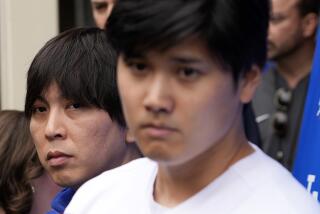Japanese Internet Maverick on Trial
- Share via
TOKYO — Once an icon for a new generation of Japanese go-go capitalists, fallen Internet mogul Takafumi Horie on Monday declared himself not guilty of accusations that he masterminded a scheme to falsify corporate earnings and inflate stock prices.
Speaking on the opening day of his trial, the brash entrepreneur called the case against him “full of malicious intent from the beginning” and said, “I have not carried out or instructed such crimes as were mentioned.
With his cropped hair, dark suit and blue tie a concession to the formality of the proceedings, he added, “It is regrettable that I have been indicted.”
Horie’s combative declaration of innocence was the opening shot in a circus-like trial involving his activities as head of Livedoor Inc. While there, he turned a $50,000 investment in a small Internet consulting company in 1996 into a network of media firms worth $6 billion by 2005.
The trial is expected to last three months.
Horie’s legal troubles have been center stage in Japan all year. He was taken into custody in January during a police raid that was broadcast live on national TV. Horie was released from detention in April after posting bail.
His arrest sparked chaos on Japan’s securities exchanges. The sell-off, known as the Livedoor Shock, took about $327 billion off the value of Tokyo Stock Exchange listings and swamped its computers with so many orders that it had to shut down trading.
The proceedings are widely seen here as a showdown between an upstart celebrity businessman who wore T-shirts to meetings and pushed the legal boundaries of securities trades, and a business establishment he mocked as stodgy.
The substance of the trial, however, is whether Horie conspired with four Livedoor executives to falsify its earnings and to inflate stock prices by launching takeover bids for a company Livedoor secretly owned.
Two Livedoor executives have already pleaded guilty to some of the charges and are expected to provide key testimony against their former boss.
Monday’s court hearing was the 33-year-old Horie’s first chance to rebut the prosecutors’ case. His defense hinges on his ability to convince the court that he was not a party to, or aware of, the plans to deceive financial regulators and investors.
In the three months after Horie’s arrest, with Livedoor executives held in solitary confinement, a series of statements were leaked to the media that impugned Horie’s character and implied his guilt.
Indeed, one of the more remarkable elements of Monday’s proceeding was Horie’s refusal to bend to the extraordinary media assault against him and seek a plea bargain.
Most Japanese trials are built on confessions obtained from defendants during long periods of detention, with almost every case that goes to court resulting in a guilty verdict.
In a country often criticized for being unfriendly to entrepreneurs, Livedoor owed its explosive growth to frequent acquisitions financed by an expanding share price.
That aggressive approach marked the arrival of a new wave of businessmen in Japan who snubbed their noses at what they saw as the plodding style of the country’s traditional business elite.
A university dropout, Horie sought rather than shunned celebrity, balking at Japan’s social constraints against flashy displays of wealth. He drove fast cars, dated fashion models and drank Champagne.
The wealth and maverick style were parlayed into hero status among many young Japanese.
Horie even made a surprisingly strong, if ultimately unsuccessful, bid for political office last year under the banner of Prime Minister Junichiro Koizumi’s campaign to shake up Japan’s economic culture.
But his most audacious assault on the establishment’s ramparts was Livedoor’s attempted 2004 backdoor takeover of Fuji TV, one of Japan’s largest broadcasters.
The strategy involved buying shares in after-hours trading, until then a little-used practice in Japan. Horie failed to win control of the company, though Livedoor profited as the broadcaster’s stock climbed.
The dealings around that bid led to separate charges of insider trading against Yoshiaki Murakami, Japan’s foremost corporate raider.
A business ally of Horie who also aroused the ire of the Japanese establishment, Murakami pleaded guilty this year to what he characterized as an inadvertent violation of securities laws.
Horie refused to make a similar confession. He is expected to testify in November, though a verdict in the case is not expected until February.
He faces a maximum of five years in jail if convicted.
*






